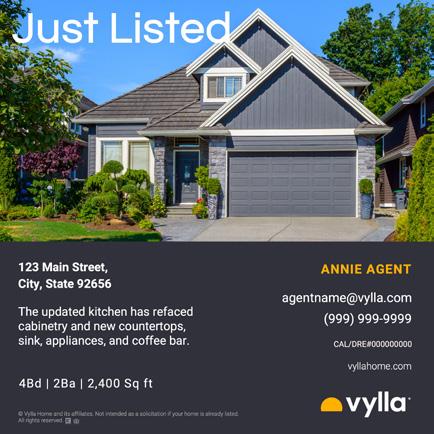Selling Experience GUIDE TO


Homeownership made simple.®
Important Background Before You Sell
There’s a lot of information out there about how to sell a home. Before you get started, it’s good to understand your options, learn how to successfully navigate a sale and how the right real estate professional can assist you. For example, do you know the difference between a listing agent and buyer’s agent? Or what makes you a client vs. a customer? These may seem like simple questions, however, here’s a quick breakdown to help you learn more.
The relationship between a real estate agent and a customer is different than a relationship between a real estate agent and a client.
If you’re a customer, you can expect...
Only statutory duties from the real estate agent, such as honesty, accounting, reasonable skill and care and the disclosure of material facts.
If you’re a client, you can expect...
A fiduciary relationship where the real estate agent will promote and protect the best interests of the client by providing obedience, loyalty, disclosure, confidentiality, accountability and reasonable skill and care. A client relationship is secured by a seller and agent signing a listing agreement.


LISTING AGENT
The seller’s representative (also known as a listing agent or seller’s agent) is hired by and represents the seller. All fiduciary duties are owed to the seller, meaning this person’s job is to get the best price and terms for the possible seller. The agency relationship is usually created by a signed listing agreement.
BUYER’S AGENT
The buyer’s representative (also known as a buyer’s agent) is hired by prospective buyers by signing a buyer representation agreement, and works in the buyer’s best interest throughout the transaction. The buyer can pay the agent compensation directly through a negotiated fee as outlined in the agreement, or the buyer’s representative may be paid by the seller or the seller’s broker through the offer negotiation process.
No matter what type of agent you work with, please know that agent compensation is negotiable and not set by law. REALTORS® are bound by the National Association of REALTOR®’s Code of Ethics to always further clients’ best interests, including showing homes that meet buyers’ needs regardless of compensation offered. Additionally, Vylla Home is committed to fair housing and ethical practices to assist all potential homeowners in their search for a new home or sale of their current one.
Steps to Sold:
Let’s review nine simple steps to selling your home!

STEP 1:
Initial Consultation
In our initial consultation, we will determine your needs as a seller. We’ll go over the full process of what to expect when selling, including timelines, pricing and a custom marketing plan.
STEP 2: Select a Real Estate Advisor
A listing agreement will be provided for review and signature, along with applicable disclosures. Discuss your positioning options with your real estate advisor and establish any buyer credits or concessions that will be part of the marketing plan.
STEP 3:
Prepare your Property
In preparation for going to market, any necessary cleaning, repairs or renovations should be completed, along with home staging. From there your home will be photographed and “coming soon” marketing will begin.

STEP 4:
Go to Market
Your home is listed! All “just listed” marketing kicks off along with showings to potential buyers, open houses and discussing any feedback received.
STEP 5: Receive & Negotiate Offers
Any offers received will be presented, reviewed and negotiated if required. Your real estate advisor will assist you to evaluate the pros and cons if you receive multiple offers.
TURN THE PAGE FOR YOUR FINAL STEPS
Steps to Sold:

STEP 6. Contract Acceptance
Once the offer is accepted, the contract package will be provided and all parties will sign.
STEP 7: Under Contract
Once under contract, your home will need to be available for necessary inspections and appraisal. Any repairs required will be negotiated and coordinated for follow-up inspections.

STEP 8: Pre-Closing & Final Walk Through
You’re almost there. Along with completing final documentation, it’s time to schedule moving services, provide utility information for your buyer’s agent and complete your final walk through.
STEP 9: Closing
Final review of all executed documents and copies will be provided. Hand over the keys to the new owners and your home is officially sold!

Initial Consultation
We know selling your home is a big step, and you may be wondering where to start. Whether it’s selling your first home or you’re a seasoned pro, having a welldeveloped plan and proper team in place can make all the difference. At Vylla Home, our mission is to make homeownership simple, and this guide will walk you through exactly how we plan to make the sale of your home simple and stress-free!

Selling Process
The initial consultation is a crucial step where the real estate advisor and homeowner(s) establish the foundation for a successful partnership. During this meeting, the real estate advisor will evaluate the homeowner’s goals and concerns, discussing the specifics of the property, local market conditions and the overall desired timeline. The real estate advisor also provides an overview of their services, outlining a customized strategy to market the property effectively, which includes pricing recommendations.
This collaborative discussion helps build trust, ensuring that both parties are aligned on expectations and next steps, setting the stage for a smooth and productive listing process. To prepare for this consultation, you should think a bit about your goals.
Understanding Your Selling Goals
What is your desired timeline for selling?
Are you purchasing a new home that is contingent on selling your current home?
Any specific financial goals or price expectations?
Do you have concerns about the current condition of the home and how that may impact the sale?
What are your negotiable items with potential buyers?
What is your tolerance for risk in the sales process?
What are your financial or future plans that could impact the sale?
By taking these steps, your real estate advisor can better understand your goals as a seller to create a customized plan that aligns with a more successful and satisfying selling experience.
If you are looking to purchase a new home while you are selling your current one, or contingent upon selling your current home, discuss this process with your real estate advisor. Together you can work to ensure the overall timelines and strategically plan meeting your selling and buying needs.

When deciding a timeline with your real estate advisor, consider the following:
Market condition
Pricing strategy
Property condition
Marketing and exposure
Buyer financing
Negotiations and offers
Inspection and appraisals
Closing process
More on Pricing Strategies
The price of your home is a major factor in the overall sales process. If priced too high, your home may sit on the market, and you may receive less interest and ultimately fewer or no potential buyers. If priced too low, while you may garner a lot of interest, you ultimately risk having to sell at a lower price than desired. Your real estate advisor can also review inventory to understand if the market is currently a “seller’s market” or “buyer’s market,” which impacts the number of potential buyers and could ultimately have an impact on pricing.
Keep in mind that properties will typically have the most buyer interest right when they are listed, so pricing correctly up front helps ensure maximum visibility and attention. Once you have a buyer under contract, having the home priced correctly can even help you close on time since you are less likely to have appraisal issues. Here’s how your real estate advisor will study the market to suggest the best pricing for your home.

Comparative Market Analysis (CMA)
The real estate advisor will present and discuss your home’s competitive position in the market, which helps potential buyers understand how your property stands out among others available in the area. This includes highlighting unique features such as recent upgrades, and the overall value proposition of your home compared to similar properties.
A comparative market analysis (CMA) will also be provided to buyers, showcasing how the property’s pricing, condition and amenities align with or surpass other homes on the market. This process aims to provide you with more information about your home’s selling features, and make potential buyers aware of the property’s strengths. All of this information also assists to not only select but justify the final sales price to the market, increasing the likelihood of attracting serious offers and potentially speeding up the sale.
Marketing Plan
One important factor in selecting your real estate advisor will be their custom marketing plan. This plan should be designed to showcase your property uniquely and effectively attract potential buyers through tailored strategies. In our marketing plan, we will highlight the property’s features and also strategically target potential buyers, leveraging both modern and traditional marketing techniques to maximize visibility and attract serious offers.


During the initial consultation phase, your real estate advisor will:
Provide insights into current market trends that could impact your sale.
Offer a comparative market analysis (CMA) report to set the listing price by comparing similar properties.
Answer questions on federal and state fair housing laws.
Inform you about the working relationship between a seller and real estate agent - based on state law and the REALTORS® Code of Ethics - and clarify agency relationships, as well as obtain any state-required legal consent to represent you.
Walk you through the home sale timeline, including preparation, market entry, offers and closing.
Assess your goals, concerns, property condition specifics and desired timeline.
Help you consider negotiable items, risk tolerance and how these factors might impact future plans.
Present an overview of services, including pricing strategy and a customized marketing plan.

Select a Real Estate Advisor
Research, recommendations and referrals! Choosing a trusted real estate advisor to represent your home for sale is a big step. Make sure to do your homework and feel comfortable with your real estate advisor before signing an agreement.

Our Vylla Home real estate advisors will put you first to help achieve your home selling goals, all while creating a seamless experience and creating the most value for you.
The Listing Agreement
Once you’ve selected a real estate advisor, the next step is formalizing the relationship by signing the listing agreement and applicable disclosures. The listing agreement contract outlines the terms of the arrangement, which will generally include:
The real estate advisor’s compensation which you have discussed and agreed to
Your final determined listing price of the property
The duration of the agreement
Disclosures required by the state
Finalize Your Competitive Position
Your real estate advisor will educate you on your home’s competitive position in the market. Beyond just pricing, they should provide you with a comprehensive understanding of how your property stands against similar homes and what potential strategies can enhance its attractiveness. Strategies will always include a competitive pricing plan to ensure your home is priced correctly, and may include certain repairs, renovations or staging in your home as well as strong marketing tactics that will provide the ultimate exposure.
NOTE: A seller net sheet is a valuable tool to help you understand how much money you will walk away with after your sale, including what closing costs or fees you may have to pay as part of the sale. Ask your real estate advisor to generate a net sheet for you as part of helping you understand your home’s overall competitive position, pricing and credits or concessions.
Review Credits & Concessions
As part of setting the sales price through your CMA and setting the terms of the listing agreement, you may establish any buyer credits or concessions you are willing to offer as part of the marketing strategy with your real estate advisor. This involves negotiating terms that benefit the buyer during the purchase process. These concessions might include offering a credit towards closing costs, covering certain repairs or providing allowances for home improvements. The purpose is to make the property more appealing and address any concerns that might arise during negotiations. For instance, if a buyer is hesitant about the cost of necessary repairs or closing expenses, offering a concession can help overcome objections and facilitate the transaction. The terms of these concessions are typically negotiated between the seller and buyer (or their real estate advisors) and are formalized as part of the purchase agreement.

During the phase in which you are selecting a real estate advisor, you can expect:

Help you select a trusted real estate advisor by providing a wealth of information about the services they can offer.
Review local sales trends to current market conditions that may impact your home’s positioning in the market.
Formalize the relationship by signing a listing agreement and any necessary disclosures, including details of compensation, final listing price and duration of the agreement.
Offer strategies to enhance attractiveness, including pricing, potential repairs, renovations, staging and marketing.
Generate a seller net sheet to show how much you will net from the sale after closing costs and fees.
Establish any buyer credits or concessions as part of the marketing strategy.

Prepare Your Property
When you effectively prepare your property for the market, it makes your property more appealing to potential buyers and increases the chances of a successful sale. Preparing your property for sale may involve a series of steps that will ultimately ensure your home is presented in the best possible light to attract buyers and achieve the most favorable sales price and timeline.
At this time, you will want to complete any necessary repairs or renovations that may be advised by your real estate advisor as a preparation to go to market. A well-maintained home is perceived as more valuable and could potentially lead to more offers, and your advisor will help you understand which repairs or touch-ups you should make that have the biggest impact or return, such as:
Fresh paint on the interior or exterior of your home –sometimes it’s as simple as painting a door!
Fix leaky faucets, broken tiles or damage to walls that may attract negative attention at a showing.
Major issues, such as a non-functioning HVAC unit or an aged roof that is more than 20 years old.
Beyond repairs or true renovations, there may be simpler updates that can benefit your home sale, such as updating your landscaping with fresh new plants, flowers or mulch to enhance curb appeal.
Lastly, you’ll likely want to spend some time cleaning and decluttering your home. Upon your preference and recommendations from your real estate advisor, you may also choose to depersonalize your home by removing photos on walls or other personal mementos.
Once these preparations are completed, your real estate advisor will help you evaluate if staging is required for your property. Staging can be crucial to visually maximize space and highlight the property’s best features, however your home may not need full staging such as new furniture.
Overall, we know first impressions matter so preparing and staging can go a long way towards the successful sale of your home.
Photography
Your real estate advisor will help you arrange photography of your home. High-quality photos are often the first interaction potential buyers have with a property, especially as more and more people search for homes online. Attractive, well-lit images and videos can ensure potential buyers have a view of the entire property, see the home and land’s condition, and even view the neighborhood and surrounding areas – capturing their interest and encourage them to learn more or schedule a viewing.
Photography plays a vital role in presenting your property in its best possible manner, engaging potential buyers, and supporting successful marketing and sales strategies. Investing in high-quality images and videos can significantly impact the speed and success of selling a home, so work with your advisor to understand your options including not just photography, but videography, 3-D imaging, aerial photography and videography, drone capabilities and more.

PRO TIP: Will you be staging your home and living in it at the same time? Communicate with your stager or real estate advisor to understand the plan and how it may affect your daily life. Minimize clutter and personal items, as the less clutter you have, the easier it will be to keep the home looking staged and “showing ready!” You should also avoid rearranging any staged furniture or décor. Keep things tidy, especially prior to a showing, and remember…this is just temporary!
Coming Soon
Once your home is fully prepared, “coming soon” marketing may begin. Your real estate agent will advise you on the best path forward, but “coming soon” can be a strategic approach used to build anticipation and generate interest in a property before it officially hits the market. This tactic helps create buzz and attract potential buyers early, often leading to a quicker and more successful sale.
That said, there are varying regulations and guidelines related to this type of pre-listing activity, and certain states and Multiple Listing Services (MLS) rules may prevent your advisor from offering “coming soon” marketing. No matter what your region allows, note that all Vylla Home real estate advisors are held to a standard of ethical practices and in no case will marketing be used to deceive buyers, or limit access to buyers, for your home.

During the property preparation phase, your real estate advisor will:

Advise on necessary repairs, renovations, cleaning and decluttering to enhance home value and appeal.
Evaluate the “value” of staging to highlight the property’s best features.
Arrange high-quality photos and videos to showcase the property online, and explore additional visual tools like 3D imaging, aerial photography and drone footage.
Advise on using “coming soon” marketing to build anticipation before listing.
Ensure compliance with local regulations and ethical practices in pre-listing activities.

Go To Market
After all your work preparing, it’s time for your home to hit the market! This exciting step will kick off more marketing campaigns, and generate showings and open houses necessary to increase the visibility of your home. Let’s review what happens after that “For Sale” sign is officially placed in your front yard!
Showings & Open Houses
Your real estate advisor will likely organize and promote open houses to attract potential buyers. Having open houses on various days and at different times allows for more buyers to be able to view your home in accordance with their schedules.
Open houses allow your real estate advisor to spend personal time with interested buyers, helping to not only highlight your property and answer the potential buyer’s questions, but also gauge interest from buyers and understand if there are any aspects of your home that seem to be a concern and could impact the sale. Your real estate advisor will ensure that there is adequate directional signage and promotion for the open house, as well as help to do some light staging and prep work before the open houses, such as turning on all lights, opening doors and windows, etc.
Showings, or private tours of your home with potential buyers, are also a key portion of the sales process. Typically any showings for buyers will be accompanied by the buyer’s agent, or a private showing between the buyer’s agent and the potential buyers will take place.
You can work with your real estate advisor to determine how you’d like to manage and schedule all open houses and showings. For each event scheduled, your real estate advisor should highlight the property’s best features, answer questions and create a positive impression of your property.
“Just Listed” Marketing
Effective “Just Listed” marketing is essential to generate interest and attract potential buyers. Items that may be included are:
Printed flyers
Neighborhood mailers such as postcards
Email campaigns
Social media posts and promotions
Website updates

Feedback and Necessary Adjustments
Your real estate advisor may ask for feedback after the open houses or private showings from potential buyers. Real estate advisors may follow up with potential buyers after the showing to gauge their interest and answer any additional questions they might have. Once feedback is received the real estate advisor will share findings with the seller, and discuss any possible adjustments that could be made to enhance the visibility and attractiveness of the home.

During the go to market phase, your real estate advisor will:
Utilize various marketing strategies, such as printed flyers, neighborhood mailers, email campaigns, social media posts and website updates to generate interest.
Determine the best campaign for promoting and hosting effective open houses to attract potential buyers that align with your goals.
Implement the agreed upon staging strategies to best highlight your home.
Utilize signage to create awareness and direct buyer traffic to the property for open houses and showings.
Arrange private showings to allow potential buyers to tour the home.
Collect feedback from buyers after showings and open houses to discuss any adjustments needed to improve the home’s appeal.

Receive & Negotiate Offers
At this stage, potential buyers have seen your home, so now you’ll start recieving offers! An experienced real estate advisor can help you navigate how to review and negotiate any appealing offers for the best possible outcome. Here are some factors to consider:
Offers
Offers are submitted and received in writing, and will include details such as the proposed purchase price, contingencies and the closing date. The real estate advisor must ensure that the offer includes all necessary documents, such as proof of funds or pre-approval letters, to validate the buyer’s ability to proceed. Once received, the offer or offers will be presented to you, evaluating the strength of the buyer’s financial position, any concessions, contingencies or conditions in the offer and how well the offer meets your needs and timelines. This can be done through a detailed summary or a face-to-face meeting. Your real estate advisor will explain the terms of each offer, including any conditions that might affect the sale such as financing or inspection requirements.
If the initial offers don’t meet expectations, the real estate advisor may craft a counteroffer for buyers whose offers are closest to your desired goals and outcome. This might involve terms such as adjusting the price, changing contingencies or altering the closing date. Negotiations often involve back and forth communication, but don’t worry – your real estate advisor will manage this process efficiently, ensuring that all parties are kept informed and that negotiations stay on track.
If multiple offers are received, the real estate advisor will help you weigh the pros and cons of each offer, considering not just the price but also other factors like buyer qualifications and flexibility.

During the recieving and negotiating offers phase, your real estate advisor will:


Receive, organize and present all written offers.
Assist you in evaluating and carefully reviewing all terms within each offer to best assess how each may align with your financial goals.
Validate buyer’s ability to proceed.
Prepare and submit a response, which may include creating counteroffers if needed, adjusting terms like price, repairs or contingencies and manage negotiations while keeping all parties updated.

Contract Acceptance
Congrats, you’ve received an offer you would like to accept from a potential buyer! Only a couple more steps before all items can be finalized and your home will be officially under contract. Your real estate advisor will outline the steps that follow acceptance of the offer, which includes the formal acceptance process, a signed contract and the timeline for inspections, appraisals and closing.

Offer Acceptance
Once you have fully discussed the offer with your real estate advisor and decide to accept, the contract creation and signing will begin. Your real estate advisor will assist in preparing and signing the necessary documentation to formalize the acceptance. This typically involves drafting or finalizing the purchase agreement and any related documentation or addendums as part of a contract package. They will then coordinate with the buyer’s agent, escrow or title companies and any other parties involved to ensure a smooth signing process.
The Contract Package
Your real estate advisor will create a binding contract package, carefully reviewing the contract to ensure that all terms, conditions and signatures are correct and complete. This includes verifying that any counteroffers or amendments have been correctly incorporated. Please note that each region may have different processes or documents that are part of your contact package, and your real estate advisor will know what should be included. Regardless of where you live, the binding contract package will include all necessary documents, such as:
The purchase agreement or sales contract
Addendums or amendments
Disclosure forms such as a property condition disclosure or leadbased paint disclosure
Inspection reports, if available
Any other relevant documentation
Your real estate advisor will explain each document and its purpose so you always understand what they are signing and why. They will also highlight and review the key terms of the contract including purchase price, earnest money deposit, contingencies such as financing or inspection, closing dates and any special conditions or requests. At this time your real estate advisor will be available to answer any questions you may have, including clarifying language or explaining special terms.
The real estate advisor will also ensure all required signatures are completed, whether that is in person or electronically. Once the seller has signed the contract, the real estate advisor will promptly send the signed documents to the buyer’s agent and the appropriate parties such as the escrow or title company to finalize the agreement. The real estate advisor will confirm receipt of the package with the buyer’s agent and will continue to follow up to ensure there are no additional questions or concerns, and deadlines are met.

During the contract acceptance phase, your real estate advisor will:

Prepare and review the contract package, including purchase agreement, addendums, disclosures and any applicable inspection reports.
Explain each document included in the contract package, ensuring accuracy of each piece and confirming your understanding of the terms and conditions.
Assist you to ensure the purchase agreement and related documents are signed by all parties, creating a binding contract package.
Send binding contract package to the buyer’s agent, escrow and/or title company.
Confirm receipt and follow up to address any questions or concerns from buyers or other parties involved in the transaction.

Under Contract
Once your real estate advisor confirms all necessary documentation has been signed on both sides, you are officially under contract! This is a big milestone in the sale of your home and although there are still a few more steps, the end is near! Your real estate advisor may reiterate the key terms and milestone

Inspections & Appraisal
Home inspections and appraisals are up next, so as a seller you will want to prepare your home for inspections. Although your home was prepared and “buyer ready” when you went to market, it is good to repeat these steps to ensure your home is ready and available for the inspections that need to occur.
Inspection Preparation
Clean and declutter all rooms
Ensure access to all areas such as attic, basement and crawl spaces
Repair minor issues such as leaky faucets and nonfunctional light bulbs
Have relevant maintenance records and repair documentation handy
Secure pets and clear any obstacles
Appraisal preparation
Enhance curb appeal such as lawn and landscaping care
Document recent upgrades and improvements
Address potential safety concerns such as loose railings
Provide access to all rooms and key areas dates within the contract, including the purchase price, inspection and appraisal timelines, closing date and any special conditions or contingencies to you so you can stay on track during the period under contract.

As part of the buyer’s due diligence process, it will be their responsibility with their real estate advisor to schedule these inspections. Generally, the buyer will communicate the scheduling of inspections with the buyer’s agent, who will communicate directly with your real estate advisor who will then schedule accordingly with you. Your real estate advisor will share what you can expect during the inspection and appraisal to address any special requirements or
Once the home inspection and appraisal have been completed, you may receive a copy of the inspections, or receive a request for repair from the buyer as an addendum. You’ll review the report’s findings with your real estate advisor to go over any necessary repairs, or discuss repairs that may need to be negotiated.
When reviewing the request for repair addendum by the buyer, you and your advisor will determine what issues are major concerns and which are minor. Major issues may include safety hazards or significant repairs, while minor issues could be cosmetic or minor maintenance. You will be advised to get estimates for major repairs to understand the potential cost involved, and then decide which repairs are acceptable and realistic to tackle based on the
Another option would be to discuss whether it’s better to complete the repairs before closing, or offer a credit to the buyer for them to handle this work after closing and on their own time and budget. This decision can depend on the nature of the repairs such as cost and timeline, as well as your personal
Once you’ve decided how to address the repairs, your real estate advisor will prepare a response to the buyer’s agent. This response will outline which repairs will be completed, which will be offered as a credit and which will not be addressed. If offering a credit, your advisor may include estimates or quotes
for the repairs as part of the response. Although your response to repairs has been submitted to the buyer, be prepared for further negotiations. The buyer may request additional repairs or adjustments, but don’t fret – your real estate advisor will help negotiate these terms to reach a mutually agreeable solution. Once an agreement of all parties has been made, the changes will be formalized and documented in writing. These are often presented in an addendum to the purchase agreement and your real estate advisor will ensure these changes are properly recorded and signed by both parties.
Prepare For Follow-Up Inspections
If repairs are to be completed, your real estate advisor may help you schedule and oversee the work, ensuring it’s done promptly and meets the buyer’s expectations. As a seller, you may need to contact a professional to complete the repairs based on your agreement with the buyer. Once repairs are complete, the real estate advisor will provide the buyer with documentation or receipts to confirm that the work was done. In some cases, follow-up inspections may be necessary.

Title, Inspection & Mortgage Process
The listing real estate advisor’s role may extend beyond just marketing the property and managing offers. They can also play a crucial part in assisting you through the title inspection and mortgage process. A title report will be ordered and your real estate advisor will help you understand the title report, which includes information about any existing liens, encumbrances or claims against the property. If there are any issues or complications (such as unresolved liens or boundary disputes), the real estate advisor will help in addressing them or provide recommendations for resolving these issues. In addition, your real estate advisor will act as an intermediary between you and the title company, ensuring
that all necessary documents are completed and submitted on time.
A home inspection may occur depending on the terms of your agreement, and your real estate advisor will educate you about what to expect during the home inspection, including typical areas of focus, potential issues that may be flagged, and the overall timeline. Prior to the inspection, your real estate advisor may recommend any minor repairs or improvements that could enhance the property’s condition and potentially avoid issues during the inspection. If significant issues are found, the real estate advisor will inform the seller on how to address them, whether it involves making repairs, obtaining estimates from contractors, or negotiating solutions with potential buyers. This may include strategizing on which issues to address, offering credits or adjusting the sale price.
If the seller has an existing mortgage, your real estate advisor may be able to review the terms and conditions to understand any potential impact on the sale, such as prepayment penalties or outstanding balances.

During the contract phase, your real estate advisor will:

Review key terms to ensure all milestone deadlines are met.
Guide you in preparing for inspections and appraisals, which may include some cleaning, ensuring proper access and/or addressing minor repairs.
Help you understand and review inspection reports and repair requests so you may decide on which repairs to complete, or if you’d like to offer credits or alternative solutions.
Negotiate terms if needed and document agreed changes. Provide documentation or receipts of any repairs completed to the buyer.
Assist with understanding the title report and review mortgage terms if applicable.
Coordinate with title and mortgage companies as necessary.
Pre-Closing & Final Walk Through
Once all necessary repairs have been completed, you will now get ready for the pre-closing and final walk through stage. You’re almost to the finish line, but this stage can include some heavy lifting—literally—as you begin moving out of your home.

Schedule Moving Services
Start planning your move according to your confirmed closing date. This allows ample time to book moving services, which you’ll want to research and compare based on their services, licensing, insurance, reputation and cost. Most movers offer free quotes, and for a more accurate quote, you can often schedule in-home estimates where the movers assess the items to be moved and provide a detailed estimate. Once you’ve chosen a moving company, book your moving date as soon as possible to secure your preferred time slot.
Prepare For Moving Day

Begin packing non-essential items well in advance. Label boxes clearly and organize them for easy access. It can be helpful to pack a box of essential items you’ll need immediately upon arrival at your new home, such as toiletries, clothes and important documents. If you are using a moving company, provide the moving company with any specific instructions, such as fragile items, special handling requirements or any access issues at the new property. Ensure the moving company has clear instructions on how to access both the current and new properties.
In addition, notify the postal service, utility companies and any relevant institutions of your change of address. Schedule disconnection and reconnection of utilities and services, such as electricity, water and internet. If possible, we recommend being present on moving day to oversee the process, ensure everything is handled properly and address any issues that arise.

Provide Information For Your Buyer
Prior to moving, begin gathering and sharing relevant utility information with your real estate advisor who can communicate with the buyer’s agent. This may include:
Heating and cooling systems (if separately billed)
Any lawn, pest or pool services
You may prepare utility transfer instructions with account numbers for each utility service if known, and include information on the dates when services should be transferred or terminated. It may be helpful for you to include any relevant details, such as billing cycles, recent payment history or special instructions for setting up or transferring services. These key details will all be sent to the buyer through your real estate
The Final Walk Through
The buyer will schedule a final walk through with their real estate advisor. As a seller, you do not need to be present, but the buyer and the buyer’s advisor will be, and your real estate advisor may also suggest that they attend for a seamless final review. The primary purpose of a final walk through is for the buyer to confirm that the property is in the condition agreed upon in the purchase contract, including checking on the repairs or changes requested and ensuring they have been completed as agreed. At this time, they may also verify that any items or appliances included in the sale are present and in working order. As a seller, you will need to prepare for the final walk through.


Complete Repairs: Ensure that any repairs or maintenance work agreed upon during the negotiation phase is completed. This might include fixing issues identified during the inspection or repairing items specified in the contract.
Clean the Property: Clean and tidy up the property before the final walk through. This includes removing personal belongings and ensuring the home is presentable.
Remove Personal Items: Remove all personal belongings from the home, including furniture, clothes and any items not included in the sale.
Ensure Utilities Are On: Make sure all utilities (electricity, water, gas) are still functioning so the buyer can test systems like heating, cooling and plumbing.
The final walk through usually occurs within 24 to 48 hours before the closing. Unless problems or discrepancies are discovered during the walk through, the closing will proceed as scheduled. If problems or discrepancies are found, the buyer might request additional repairs or adjustments. This could potentially delay the closing if issues are significant. If issues do arise during the walk through, your real estate advisor will address them promptly with you. This may involve completing additional repairs or negotiating solutions with the buyer. Your real estate advisor will ensure that any agreed-upon changes or repairs are documented in writing, which many include any agreements made during the walk through to resolve issues.
Prepare For Closing
You and your real estate advisor will review all applicable preliminary documents in preparation for closing. The closing documents may include:
Closing disclosure statement
Settlement statement
Title report
Escrow instructions
In addition, you will also want to prepare any required documents, such as a valid ID, the original deed or any affidavits required for closing.
The finish line of your home selling experience is near! It’s almost time to hand over the keys.
During the pre-closing and final walk through phase, your real estate advisor will:

Recommend local, trusted vendors such as movers.
Gather utility details to share with the new buyer.
Complete the final walk through and assist you with addressing any issues promptly.
Collaborate with other professional advisors involved in the sale of your home to provide clarity around closing documents such as the closing disclosure statement, settlement statement, title report and escrow instructions.

Closing
Congrats, we are now in the final step of successfully selling your home and have officially entered the closing stage!
You and your real estate advisor will set up a time to review and execute all seller closing documents. It’s important to read each document carefully before signing to ensure all information is correct and understood.
Closing Disclosure Statement: Check all terms, sale price, credits and closing costs are correct and align with the purchase agreement. Confirm that any seller credits or adjustments (such as repairs or concessions) are accurately reflected.
Settlement Statement: You will review this form to make sure it matches the closing disclosure and reflects all agreedupon terms. Verify all fees, including your real estate advisor’s compensation, transfer taxes and any additional closing costs.
Title Documents: Review and confirm the title is clear of any liens or encumbrances. Verify the property description and legal details are accurate on the deed to prepare for the anticipated transfer of ownership.
Escrow Wiring of Funds: Review the instructions to understand the handling of funds and any additional requirements. Wiring instructions will be provided by the closing attorney or title company.
Review Any Additional Documents: Check any additional documents required by the closing process, such as affidavits, tax documents or property disclosures.
Once all closing documents have been reviewed and all questions have been answered, you can now execute all paperwork. Sign and date in specified sections with your correct full name and current date. Bring valid identification to the closing to verify your identity for a notary, who will likely be present. A copy of all fully executed closing documents will be provided.
Deliver Keys
It’s time to provide the buyer(s) with the keys to their new home! Work with your real estate advisor to determine the best transfer method. If the keys are to be provided at closing, obtain confirmation in writing from the buyer or their agent that the keys have been received. Prior to providing, make sure to gather all keys such as front and back doors, garage doors, mailboxes, storage areas or any additional necessary keys!
Remove Signage and Lockbox from the Property
It is the real estate advisor’s responsibility to remove any signage or lockbox from the property immediately after closing. If the closing is on the same day as the buyer’s move-in, the real estate advisor might coordinate the removal to ensure it is done promptly but without interfering with the buyers.
During the closing phase, your real estate advisor will:

Assist you as needed in reviewing and signing documents.
Coordinate the transfer of keys to the buyer, ensuring you have all necessary keys and confirming receipt in writing if transferring at closing.
Remove all property signage and lockbox post-closing.
Celebrate! Your home has been officially sold.

Marketing made simple with maximum exposure
One key to a smooth and successful sale is ensuring your property has maximum visibility through an effective marketing campaign.
While many real estate advisors may have their own marketing preferences, our advisors will give you a clear sense of the marketing campaign for your property before and during the go to market phase. In today’s world, we know more than 50% of buyers look for homes online - so visibility is key.
Here are just some of the strategies your real estate advisor may identify as helpful methods to market your property:
Massive internet exposure: On Vylla Home’s website, your real estate advisor’s website and many others—including local multiple listing (MLS) sites and global syndication—allows your property to be seen far and wide.
Marketing right on your front lawn: We’re all familiar with “For Sale” signs in yards, but our unique Vylla Home yard sign can bring even more attention to those passing by—you won’t miss our signage that shines!
Printed materials: Marketing pieces from open house handouts to custom mailers, your advisor can create and distribute items that highlight not just your home, but current market trends and benefits of your neighborhood too!
Mobile marketing: Your home can be accessed right from a potential buyer’s hand via our Vylla Home mobile app! Giving your listing 24/7 exposure, we ensure potential buyers can view your home by also listing your property through the Vylla Home mobile app which features high-quality images. Potential buyers can save, share and track your property, and can easily contact their advisor for more details and schedule a showing of your property. The Vylla Home app also offers an innovative and interactive property search experience, including key details on neighborhoods, schools and local points of interest making it easier to find your home and see it from all angles!
Social media: We provide online opportunities for your home to be featured on major social media platforms. We even have an internal social media network exclusive to Vylla Home real estate advisors where they can share and promote your property to other national and local members of our team.













The Unique Value of a Vylla Home Real Estate Advisor
We
know selling your home is a big step.
Selling your home is a big life decision, so keep in mind that a professional and experienced real estate advisor can help you navigate the process so you don’t have to worry.

Why choose a Vylla Home Advisor?
Your Vylla Home real estate advisor can provide the industry resources and guidance through our family of companies, as well as the many benefits listed below:
Effective Marketing Campaigns: This can include “Just Listed” marketing to bring more excitement to the property, creating demand by leveraging multiple sources including the MLS to market, social media and more.
Large Network of Prospects: Vylla Home real estate advisors have access to not only a network of our nationwide brokerage, but also their past and present investors, clients and prospect. As a nationwide brokerage, our network is larger than most!
Efficient Showings and Open Houses: Your real estate advisor will help provide you with all the knowledge you need to prep your home prior to go to market, along with hosting open houses and showings to make your sale as efficient as possible.

Insight & Guidance on List Price: Provide a comprehensive comparable market analysis, enabling you to make a well-informed decision on your list price and helping to sell your home faster and closest to your desired price.
Provide Education Around Selling Process: Educate and help you understand the main negotiating pieces of an offer, such as price, terms, dates, inclusions or exclusions and contingencies.
Strategic Offer Structuring: Assist in crafting a strategically sound offer to purchase with terms and conditions that align with the property’s value, market conditions and your best interests.
Offer Presentation: Present all offers and provide knowledgeable feedback, ensuring that your interests are represented effectively.
Skilled Negotiations: Work diligently on your behalf to secure the best possible terms for the sale, always keeping your interests at the forefront.
Document Guidance: Explain all forms, disclosures and contracts related to the sale, ensuring you are fully informed and comfortable with the transaction.
Education on Inspections: Your real estate advisor is here to help you every step of the way, so despite inspections typically being scheduled and arranged by the buyer or buyer’s advisor, they’ll still help you prep your home before inspections and negotiate any repairs that are presented.
Post-Closing Support: Connect you with trusted vendors to cater to your post-closing needs, ensuring a seamless transition into your new property.
Vylla brings the process of homebuying under one roof.
Vylla Home makes homeownership simple, providing the easiest way to find, finance and own. Team up with a knowledgeable, licensed Vylla Home real estate advisor to help you expertly navigate the complexities of the homebuying process and simplify your homeownership journey from start to finish. We offer the highest level of service available to ensure you have a place to live, grow and make memories with a home.
Vylla’s national footprint and full-service model provide a truly progressive approach to the real estate process, creating extraordinary experiences for our clients. We are part of the Carrington family of companies which means we can offer all aspects of homeownership under one roof.
MORE THAN $21 BILLION sold since inception
113, 684+ Transactions sold since inception
16 years of real estate experience
To learn more about VH local offices/locations, visit vyllahome.com/offices

What does it mean to be a homeownership company?
We represent every aspect of the real estate transaction under one roof for our clients. From asset management and mortgage operations to title and escrow, our family of companies offers much more than your standard real estate brokerage.


Mortgage Lending


Title & Closing

Our Family of Companies
Carrington Mortgage Services, LLC (NMLS ID #2600) is a fully integrated mortgage company with lending and mortgage servicing operations. We are committed to providing superior customer service, from assisting our customers in selecting the right loan for their needs to closing loans on time, every time.
carringtonmortgage.com
Vylla Title is an industry-leading expert providing simple, cost-effective, and specialized title and settlement services nationally. We work with institutional clients and the real estate community, nationally, to transform the real estate process by managing transactions quickly and smoothly, every time. When it comes to our customers, they always come first.
vyllatitle.com

Carrington Charitable Foundation gives back to the communities in which we live and work. CCF is proud to support our Veterans by providing Mobility, Stability, Purpose and Prosperity.
carringtoncf.org
Glossary
AGENCY TERMS
Agency creates a legally binding relationship between the licensed real estate advisor and their client during the buying and selling process Agency terms are set once an agreement is signed.
APPRAISAL/ APPRAISED VALUE
An opinion of the market value of a home expressed by a real estate appraiser.
ASSESSED VALUE
Value placed on a property by a municipality for purposes of levying taxes. May differ widely from appraised or market value.
BUYER’S AGENT
The buyer’s representative (also known as a buyer’s agent) is hired by prospective buyers by signing a buyer representation agreement, and works in the buyer’s best interest throughout the transaction.
CERTIFICATE OF TITLE
Document signed by a title examiner stating that a seller has an insurance title to the property.
CLOSING
Process by which the deed to a property is legally transferred from seller to buyer, and documents are recorded.
CLOSING COSTS
Expenses in addition to the price of the home incurred by buyers and sellers when a home is sold. Common closing costs include escrow fees, title insurance fees, document recording fees and real estate commissions.
COMMISSION
Fee (usually a percentage of the total transaction) paid to an agent or broker for services performed.
COMPARATIVE MARKET ANALYSIS (CMA)
An estimate of a home’s price used to help sellers set listing prices and help buyers make competitive offers. The analysis considers the location, age, size, construction, style, condition and other factors for the property and comparables.
CONTINGENCY
Condition in a contract that must be met for the contract to be binding.
CONTRACT
Binding legal agreement between two or more parties that outlines the conditions for the exchange of value (for example: money exchanged for title to a property).
DEED
A legal document conveying ownership of property.
DOWN PAYMENT
Percentage of the purchase price of a property that the buyer must pay in cash. It may not be borrowed from the lender.
DUAL AGENCY
When a single agent represents both the buyer and seller in a real estate transaction. It can also occur when the same real estate company represents both parties in a purchase and sale or rental transaction.
EQUITY
The difference between a home’s value and the mortgage amount owed on the home.
ESCROW
The holding of documents and money by a neutral third party prior to closing.
FIXTURE
Any object permanently attached to a property by way of bolts, screws, nails, glue, cement or other means. Items like chandeliers, ceiling fans and window treatments are generally seen as fixtures and will stay with the home in a real estate transaction.
HAZARD INSURANCE
A form of insurance in which the insurance company protects the insured from specified losses, such as fire, windstorm and the like.
LIEN
A claim upon a piece of property for the payment or satisfaction of a debt or obligation.
LISTING AGENT
The seller’s representative (also known as a listing agent or seller’s agent) is hired by and represents the seller.
LISTING CONTRACT
Agreement whereby an owner engages a real estate broker for a specified period of time to sell a property for which, upon the sale, the brokerage receives a commission.
MARKET PRICE
The actual price at which a property is sold.
MARKET VALUE
The highest price a buyer would pay and the lowest price a seller would accept on a property. Market value may be different from the price a property could actually be sold for at a given time.
MULTIPLE LISTING SERVICE (MLS)
The service combines the listings for all available homes in an area, except for For-SaleBy-Owner properties, in one directory or database.
PRORATE
To divide or assess proportionately
PURCHASE & SALE AGREEMENT
A contract between buyer and seller that outlines the details of the property transfer.
SELLER CONCESSION
A strategic arrangement in a real estate transaction where the seller covers certain costs or fees associated with purchasing a home. These concessions can make home ownership more accessible for buyers by reducing upfront expenses.
SETTLEMENT
Another term for the closing of a real estate transaction. Settlement occurs when the buyers, sellers, and their agents sign the closing documents of a transaction and the closing agent or attorney facilitates payment of all closing costs. Settlement or closing procedures vary by location.
TITLE
A document that indicates ownership of a specific property.
TITLE INSURANCE
Insurance to protect the buyer and lender against losses arising from disputes over the ownership of a property.
TITLE SEARCH
An examination of public records to determine the legal ownership of property. Usually the records are recorded with the County Recorders office. The search is usually performed by a title company using computerized records.
TRANSACTION BROKER
A transaction broker (sometimes referred to as a facilitator) is permitted in states where nonagency relationships are allowed.



© 2024 Vylla Home and its affiliates. Vylla Home, Inc. CA DRE# 02075076. This document is a guide and does not include all local and state-level regulations or processes. Please consult your local real estate advisor for additional information. All rights reserved.
